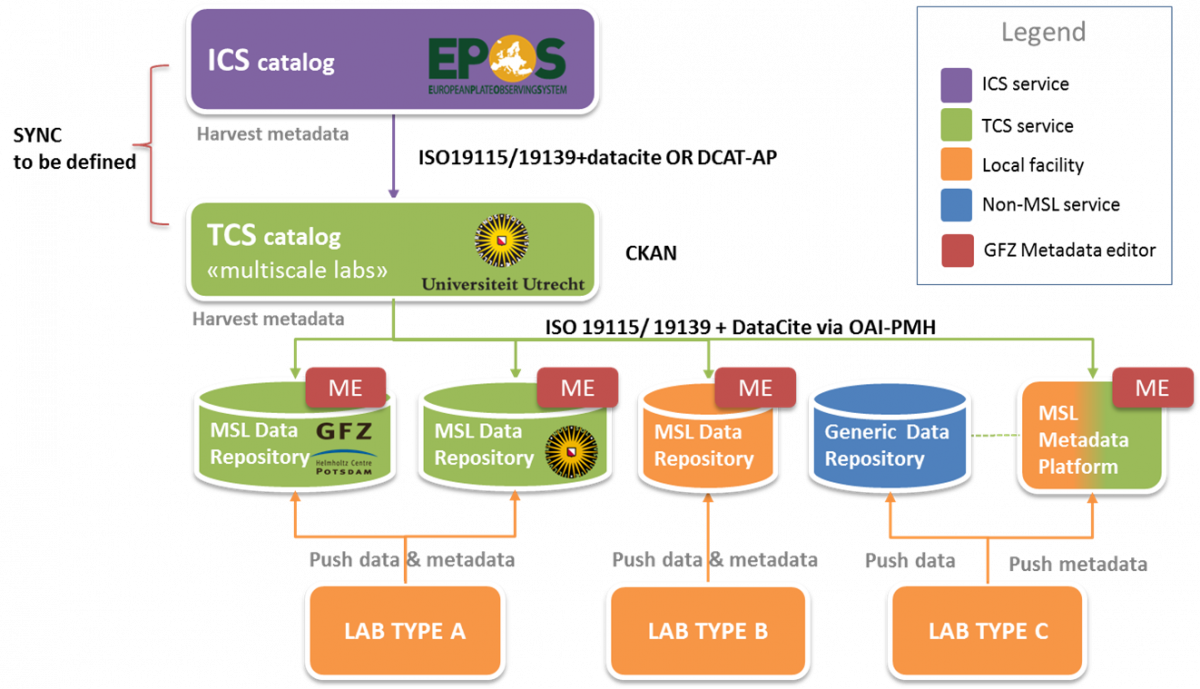High-quality datasets produced within Earth science laboratories have crucial value for exploring geo-resources and understanding the earth system evolution in general. At present, however, most datasets remain largely inaccessible and usually require at least a direct interaction with the authors, may have a specific format preventing easy sharing, and lack traceability for intellectual property and appropriate citation.
The TCS Multi-Scale Laboratories collects and harmonises laboratory data on the properties and processes controlling rock system behaviour at multiple scales. Thanks to the TCS MSL data services within EPOS, these data will become easily accessible in a homogenised format, refereed, and thus ready to be used for new research into geo-resources and geo-storage, geo-hazards and Earth system evolution.
MLS Catalogue
The Multi-Scale Laboratories Portal is a metadata catalogue of sustainable data publications, access to general lab information, and a community platform for solid Earth science lab research. The MSL catalogue retrieves and stores metadata from different repositories and supplies this metadata to the ICS’s data portal.
MSL Catalogue is the central metadata portal of the EPOS Multi-Scale laboratories TCS. In it, users can find open access data from a wide range of world-class experimental laboratory infrastructures, divided into four main solid Earth application areas: Analogue modeling of geologic processes, Paleomagnetism, Rock physics and high pressure-temperature laboratories, and Analytical laboratories.
GFZ Data Services
The GFZ Data repository provides metadata of datasets to the MSL catalogue. GFZ Data Services is a research data repository hosted at the GFZ German Research Centre for Geosciences in Potsdam, Germany, and it is open for research data and scientific software from the Earth and environmental sciences.
Since 2004, the GFZ German Research Centre for Geosciences assigns Digital Object Identifiers (DOI) to datasets. These datasets are archived by and published through GFZ Data Services and cover all geoscientific disciplines. Datasets range from large dynamic datasets deriving from data-intensive global monitoring networks with real-time data acquisition to the full suite of highly variable datasets collected by individual researchers or small teams. These highly variable data are small in size but represent an essential part of the total scientific output.
Transnational Access
The TCS Multi-Scale Laboratories is working to establish access rules to the newest and most advanced solid Earth experimental laboratory facilities in Europe.
The groups and lab facilities will be made visible to the community inside the EPOS infrastructure, creating new opportunities for synergy, collaboration and innovation, in a framework of transnational access rules.
Through this system, researchers and research teams across Europe will have the opportunity to present project proposals and be selected to perform experiments at key TCS MSL centres.
Data Providers
The TCS MSL infrastructure provides three scenarios for laboratories to supply their data:
a) through the usage of TCS-wide repositories with facilities for assigning DOI’s and adding TCS compliant metadata;
b) through the usage of a local repository that can handle TCS compliant metadata;
c) through the usage of a general repository for data storage and the TCS metadata editor for the generation of compliant metadata.
- TCS MSL IT infrastructure
-
The definition of a suitable e-infrastructure architecture is essential to guarantee that data from multi-scale laboratories are discoverable, accessible and usable. The IT infrastructure for the TCS Multi-scale laboratories (Figure 1) includes different scenarios for participation, referring to the different maturity of the laboratories with respect to IT infrastructures.

Most laboratories do not have, at the moment, data services and IT infrastructures (no repository or Multi-scale labs compliant metadata) and will act as data providers (orange boxes). Data provision to EPOS will rely on few TCS services, hosted at the four Task Leaders’ institutions (green boxes).
